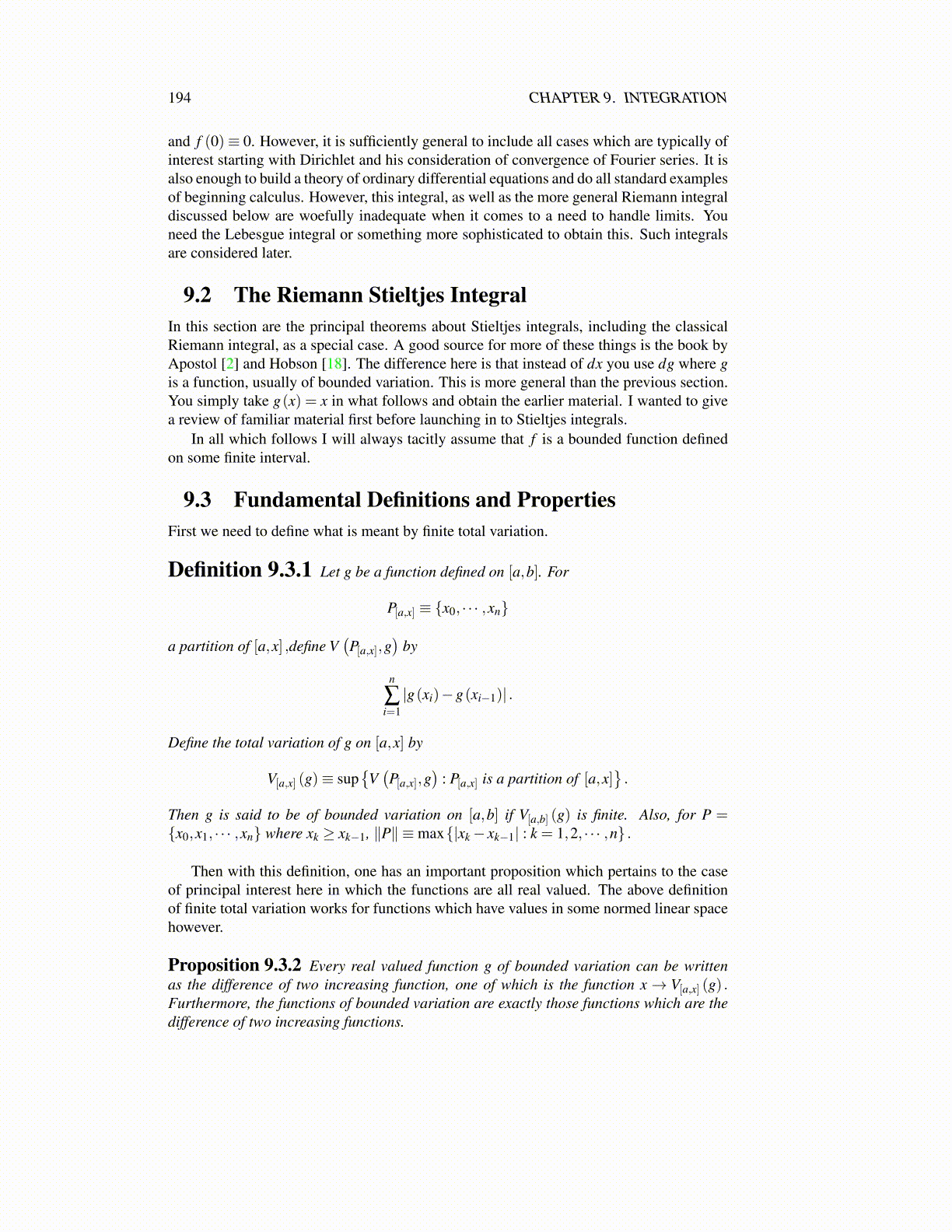
194 CHAPTER 9. INTEGRATION
Proof: Suppose you have two of them I, Î and that P, P̂ are corresponding partitionssuch that ∥P∥ ,
∥∥P̂∥∥ are both small enough that∣∣∣∣∣I−∑
Pf (zi)(g(xi)−g(xi−1))
∣∣∣∣∣< ε,
∣∣∣∣∣Î−∑P̂
f (ẑi)(g(xi)−g(xi−1))
∣∣∣∣∣< ε
whenever zi or ẑi are in [xi−1,xi]. Let Q≡ P∪ P̂ and choose zi and ẑi to be the left endpointof the sub intervals defined by the partition Q. Then ∥Q∥≤min
(∥P∥ ,
∥∥P̂∥∥) and so |I−S|<
ε,∣∣Î−S
∣∣< ε whereS = ∑
Qf (xi−1)(g(xi)−g(xi−1)) .
Then∣∣I− Î
∣∣≤ |I−S|+∣∣S− Î
∣∣< 2ε. Since ε is arbitrary, I = Î.Next is a fairly obvious theorem which says essentially that things which hold for sums
typically hold for integrals also, provided the integrals exist.
Theorem 9.3.6 Assuming all integrals make sense, the following relation exists forf ,g functions and a,b scalars.∫ b
a
(a f +b f̂
)dg = a
∫ b
af dg+b
∫ b
af̂ dg.
Assuming all integrals make sense and g is increasing, it follows that∫ b
a| f |dg≥
∣∣∣∣∫ b
af dg∣∣∣∣ .
Also, if a < c < b and all integrals make sense for I = [a,c] , [a,b] , [c,b] , then∫ b
af dg =
∫ c
af dg+
∫ b
cf dg
Proof: Consider the first claim. Since all is assumed to make sense, (It is shown soonthat continuity of the f functions and bounded variation of the g is sufficient.) there existsδ > 0 such that if ||P||< δ , then∣∣∣∣∫ b
a
(a f +b f̂
)dg−SP
(a f +b f̂
)∣∣∣∣ , ∣∣∣∣aSP ( f )−a∫ b
af dg∣∣∣∣∣∣∣∣bSP
(f̂)−b
∫ b
af̂ dg∣∣∣∣< ε
where SP (h) denotes a suitable Riemann sum with respect to such a partition. Choose thesame point in [xi−1,xi] for each function in the list. Then from the above, 3ε >∣∣∣∣bSP
(f̂)+aSP ( f )−SP
(a f +b f̂
)−(
a∫ b
af dg+b
∫ b
af̂ dg−
∫ b
a
(a f +b f̂
)dg)∣∣∣∣
However, bSP(
f̂)+aSP ( f )−SP
(a f +b f̂
)= 0 from properties of sums. Therefore,∣∣∣∣a∫ b
af dg+b
∫ b
af̂ dg−
∫ b
a
(a f +b f̂
)dg∣∣∣∣< 3ε